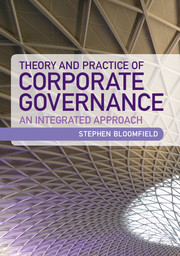Book contents
- Frontmatter
- Contents
- List of Figures and Tables
- Introduction
- Part 1 The Discipline of Governance
- Part 2 The Relationship between Law and Governance
- Part 3 Governance and the Listed Company
- Part 4 Governance and Regulation
- Part 5 Counter-governance: Failures of governance and corporate failure
- Chapter 15 Counter-governance (1): theory
- Chapter 16 Counter-governance (2): abuse of stakeholders
- Chapter 17 Concluding remarks
- Bibliography
- Index
Chapter 17 - Concluding remarks
from Part 5 - Counter-governance: Failures of governance and corporate failure
Published online by Cambridge University Press: 05 March 2013
- Frontmatter
- Contents
- List of Figures and Tables
- Introduction
- Part 1 The Discipline of Governance
- Part 2 The Relationship between Law and Governance
- Part 3 Governance and the Listed Company
- Part 4 Governance and Regulation
- Part 5 Counter-governance: Failures of governance and corporate failure
- Chapter 15 Counter-governance (1): theory
- Chapter 16 Counter-governance (2): abuse of stakeholders
- Chapter 17 Concluding remarks
- Bibliography
- Index
Summary
Policy failure
The contention of this book has been that the failure of conventional, or traditional, expressions of corporate governance to adequately account for the operation of the relationships between companies, shareholders and other stakeholders, has resulted in policy failures.
These policy failures were brought about by a conceptual failure: the original definition of corporate governance – for convenience the ‘Cadbury definition’ – did not recognise changes in the way that companies were being used and developed as engines of wealth creation. Using the analogy employed in Chapter 1, the geography of the corporate landscape was recognised but the processes – the geology – which lay underneath the formation of that landscape were not accounted for adequately. Since the original definition had little explanatory value, successive committees set up to examine corporate governance have merely added layers of unsuitable recommendations to an unsound foundation – bringing about a practice of corporate governance that bears no relation to the actual practical circumstances of companies, shareholders or stakeholders.
Inadequate and outdated definitions
The conceptual failure arose because the 1992 Cadbury Committee definition of corporate governance was rooted in a view of the British economy which was largely out-dated even as it was formulated. Since this description was the first ‘official’ definition, was compiled by an authoritative committee, and appeared to be plausible in terms of the recommendations in which it was nested, it became accepted worldwide as the benchmark. In the past twenty years, the basic expression of corporate governance, as developed by the Cadbury Committee, has changed very little in its adoption by subsequent committees of investigation, who have all taken the original formulation as the basis for developing further recommendations.
- Type
- Chapter
- Information
- Theory and Practice of Corporate GovernanceAn Integrated Approach, pp. 382 - 395Publisher: Cambridge University PressPrint publication year: 2013



